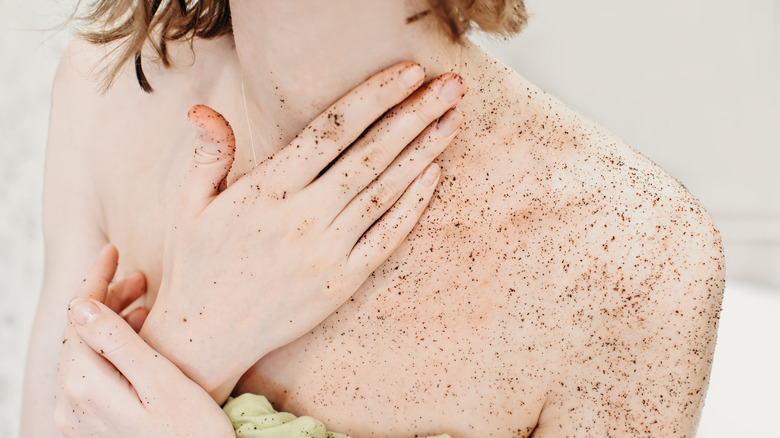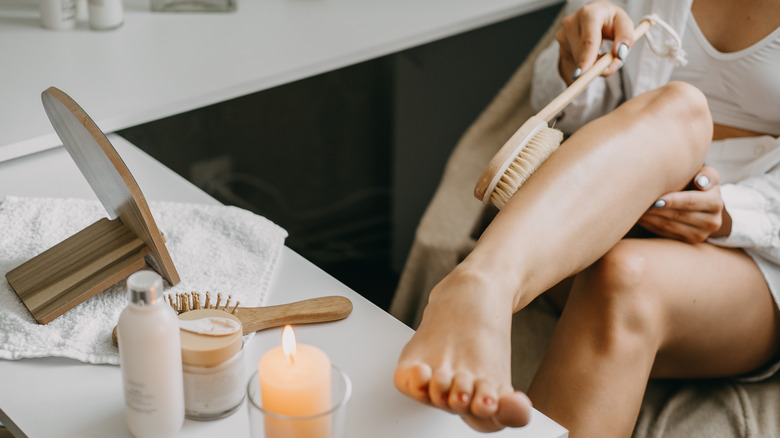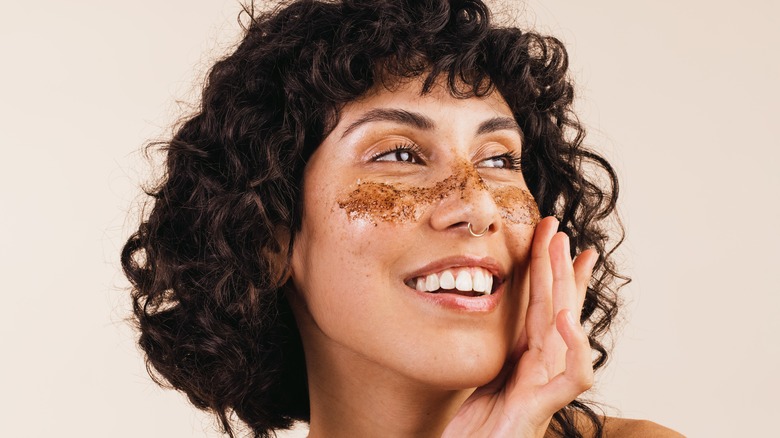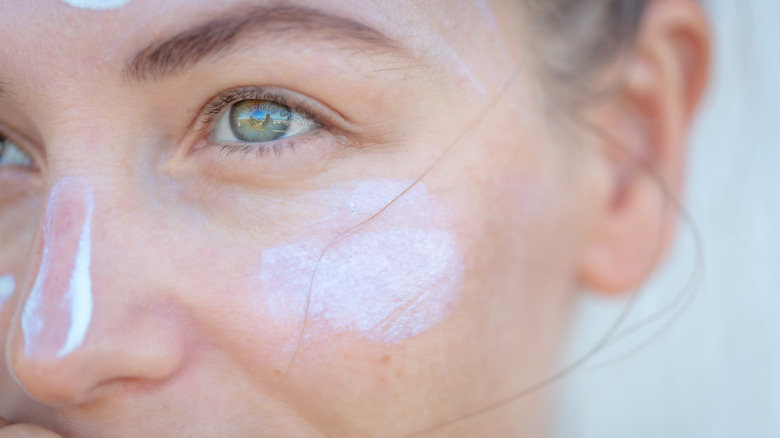The Biggest Mistakes You're Making When Exfoliating
The skincare industry has drilled it into our minds that we simply can't live without exfoliating. And while there are certainly benefits, could we be going a little overboard? Just like everything in life, there's nuance.
But first, what's the deal with exfoliators, anyways? Well, there are physical exfoliators, like face and body scrubs, that contain gritty particles like salt, sugar, seeds, or pumice. Dry brushing also falls into this category. Then there are chemical exfoliators, including ingredients like lactic acid and AHAs. The primary purpose of both is the same: to remove dirt and dead skin cells and unclog pores. A proper exfoliation habit boosts radiance, clears breakouts, improves circulation, and allows products to penetrate deeper (via Eccotique). On a cellular level, exfoliating "helps stimulate collagen synthesis to improve the skin's texture, integrity, and keep the skin looking plump, tight, and young," explains board-certified dermatologist Michelle Henry (via Byrdie).
There's no denying the benefits of exfoliating — when it's done right. But issues can arise when dealing with dry and sensitive skin. So, what if this so-called beauty essential is causing more harm than good, and when do we know the difference? Here are the most common exfoliating mistakes and what you can do about them.
Exfoliating too often
The self-care industry is obsessed with exfoliating. Yes, we said it — but it's true! Whether it's beauty influencers on Instagram sharing their ten-step routine or the latest marketing campaign promising to give us that coveted glow, there are endless exfoliation methods just about everywhere you look. Once you notice, you'll realize it's no surprise that many of us are over-exfoliating, which can, unfortunately, lead to irritation, overly-dry skin, and flaking (via Byrdie).
Since the act of scrubbing our skin is so encouraged, take stock of all the ways you may already be exfoliating before adding another product to your regimen. Does your lotion or cleansers already contain ingredients like lactic acid or fruit extracts? Are you dry brushing or using a loofah? Even shaving and drying with a standard towel exfoliates the skin (via mindbodygreen).
You can over-exfoliate by doing it too often, too long, or using a product that's too harsh for your skin type. If you're new to exfoliating, start slow at once or twice a week and evaluate how your skin reacts. "If you find that your skin sensitivity all of a sudden skyrockets, you're doing something wrong," Suzan Obagi, M.D., director of the UPMC Cosmetic Surgery and Skin Health Center, tells SELF. Obagi concludes that our skin has the power to heal itself quickly, but if you're over-scrubbing every day, she says, "that's going to put your skin in a chronic stage of low-grade inflammation and irritation."
Ignoring your skin type
Nothing is more important in skincare than knowing your skin type, especially when it comes to exfoliating. The wrong products can irritate sensitive skin or leave dry skin even more depleted. According to Westlake Dermatology, normal and oily skin types benefit from chemical and physical exfoliation methods. In contrast, sensitive and dry skin types respond best to mild chemical exfoliators like glycolic acid.
But, the super-sensitive souls may need to pass. "Exfoliation isn't for everyone," says board-certified dermatologist Raechele Cochran Gathers, M.D. "People with certain skin conditions, very sensitive skin, or those who use certain sensitizing skin care products may become more irritated with exfoliation, so before exfoliating, it's important to know your skin type and be aware of any sensitivities that you may have" (via mindbodygreen).
If you're having issues understanding what your skin needs — that's okay! You may benefit from visiting an esthetician for a facial. Going to an expert will save you from wasting your money on products that don't work for you in the long run. You may only need to go once to learn the best products to use and how to use them.
Ignoring your skin post-exfoliation
Following facial and body scrubs and chemical peels with post-care are critical. Since exfoliating strips away the outermost layer of the skin, it is inherently drying. Replenish the lost hydration with a creamy moisturizer, recommends skincare line Disco. Look for gentle, natural ingredients while avoiding hidden chemical exfoliators like glycolic, lactic, and salicylic acids. We are quick to remember our face routine but don't forget to moisturize your body too.
Now that a layer of dead skin cells has been removed and your pores are clear, serums can penetrate deeper. Antioxidant serums are incredibly beneficial yet gentle enough to use post scrub. They fight free radicals that can cause premature aging and wrinkles and decrease inflammation and dullness (via Good Housekeeping).
Last but not least, your post-exfoliation regimen needs to include an application of SPF. Freshly buffed skin is more susceptible to the effects of UV rays, so make sure to protect it with sunscreen to avoid irritation or damage (via Cleanlogic).
Follow these few easy exfoliating rules, and your skin will freshly glow from head to toe all summer long.



